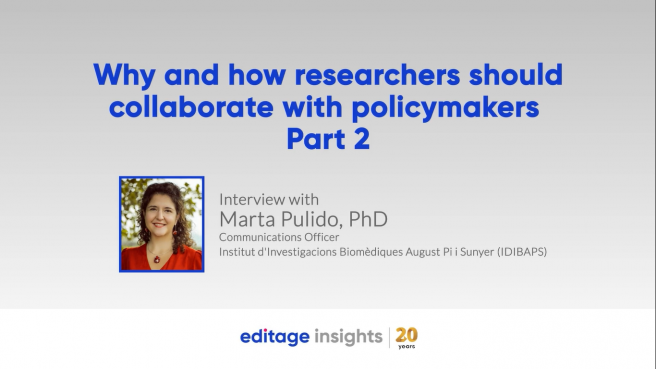Why and how researchers should collaborate with policymakers: Interview with Marta Pulido (Part 2)
Researchers worldwide are often needed to communicate the relevance of their work to policymakers. While this area of work has much in common with communicating science to the general population, there are important differences. Policy-related communication involves collaborating with policymakers and not just talking at them: it is a two-way interaction with shared goals, a common language, and shorter timelines than researchers are typically used to.
If you are a researcher whose work can directly inform policies, collaboration with policymakers need not be necessity-driven and something you do only when asked to. You can actively seek out opportunities to do so. In this 3-part interview series, Marta Pulido, Communications Officer at Institut d’Investigacions Biomèdiques August Pi i Sunyer (IDIBAPS) talks about the benefits of doing this type of work (for yourself and for the wider society), which skills you need, and how best to prepare yourself.
In the first segment of the interview, Marta discussed her collaboration with policymakers, the skills needed to communicate with policymakers, and common perceptions that scientists and policymakers may have about each other. In this second segment, by sharing examples from Latin America, Marta discusses her observations of how collaborations between scientists and policymakers can differ across regions depending on the socio-political and cultural contexts.
[VIDEO TRANSCRIPT]
Mriganka: Since you’ve done a lot of work specific to Latin America, can you share any insights you’ve gained on, you know, how collaborations between researchers and policymakers work in Latin America? And if they are, you know, how do these sorts of collaborations differ across regions? If you have that sort of perspective as well?
Marta: Well, Latin America, it’s a very interesting region, because it’s very diverse. And one of my errors when I approached the region, my colleague was from Guatemala, so she helped me a lot in this in this point, because although we can think that it’s a big region, and a big Spanish speaking region, and that they are all the same, this is not true. Every country has its, you know, its particularities. And I will say even more that in every country, there are differences between regions, because there are very big countries like Argentina, Mexico.
And when I was talking with scientists and policymakers from these countries, they say, “Yeah, but it’s not the same in what’s happening in that region and the other, so just bear in mind this, this information.”
What they have learned with them, it’s that, well, I’m from Spain, so, although this, comparing with the rest of the Europe, the science in Spain, it’s not the best one. But when comparing this science ecosystem in Spain with Latin America, well, that’s also a very big difference. They are in another step. I don’t like to say below Spain, but it’s, it’s very different. They are in another—how to say—in another ecosystem. This is the relationship, it was very difficult for me to identify this building bridges between these two arenas, because they’re both separated in Latin America.
Fortunately, there are some initiatives. For instance, in Mexico, I interview a person that is very active, she’s a scientist, and she has been working with policymakers from some years. She’s a young woman, an incredible and talented young scientist and a woman. And she was facing very—many, many difficulties. Because, well, scientists in Mexico are not very well considered between policymakers. So, policymakers are very interested in all of other topics that are not science. So, she was facing some troubles. She has some success, but it require—she said, “I really love this work. But it’s kind of frustrating when you spend months working with policymakers, and then they go to the, you know, to make the law and the regulations. And then another lobby appears and everything fails.” So, but she was like, “I will try it again, and again, and again.” Because she was very convinced that it was necessary to have this science vision in the policy arena.
I have another example in Panama. I am in a WhatsApp group between scientists and policymakers—I am involved in this group. They are they are working together to bring science diplomacy strategy for the country. So, they work together, they are very active in this WhatsApp group. And they are working together, just organizing meetings, and trainings, for both parts; to organize this, this common place to meet, to talk, to share. So, I think Panama is very well situated in this pathway. Of course, there are difficulties they are facing, not everything is a success. But you know, here you have Mexico that it’s difficult to engage, but Panama they are working together.
Another example in Chile, it was a very active movement from journalists and scientists during COVID-19, trying to convince the government to apply science in the COVID-19 policies to protect society. But there was a change in the government at the last time. And so, they, of course failed.
Another thing that many scientists commented me in Latin America, that it’s the governments are not usually some, they are changing, they are very volatile, you know.
Another difference is that science we are working with long term, scientific project take years to develop, to fully develop, and from the beginning to the final results. And the policy arena, it’s very fast. So at least, at the last, you have four years, and sometimes, well, quite often in Latin America, they don’t reach this four years.
So, the, you know, the time you have to move to really get to a result, you are very pressed by time. And when scientists go to the policymakers and get their attention, and start working; and at the end, well, it can happen that at the middle of all the process, the government changes. So, all the work, it’s like it’s lost. So, it’s a one of the particularities of Latin America, the instability in policy. So that’s the main problem that many scientists that told me that the region it’s quite difficult for this, this particularity.
Click here to watch the last part of the interview, where Marta talks about how you can prepare yourself for collaborations with policymakers and discusses examples of successful collaborations between scientists and policymakers.
You're looking to give wings to your academic career and publication journey. We like that!
Why don't we give you complete access! Create a free account and get unlimited access to all resources & a vibrant researcher community.

This content belongs to the Career Growth Stage





View Comments